People and Personalities of Damoh District
People and Personalities of Damoh District
The big stories often make the headlines of our historical narratives, but history is not only about the landmark events - it finds shape and character in the myriad events that led up to a flashpoint of change. An attempt to discover and document stories of people, events, and places linked to the freedom struggle of India at the micro level of the district has led to the creation of a Digital District Repository. Stories in this section can be broadly classified under - People & Personalities.
Brijnandan Kiledar
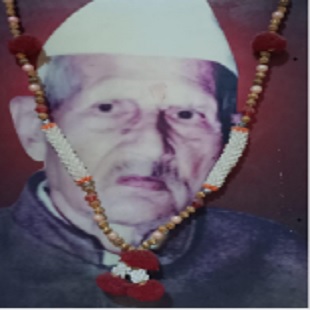 Brijnandan Kiledar was born on 1 January 1902, in the Kiledar family of Lalitpur (U.P.), he emerged as a prominent freedom fighter. His father, Nandkishor Kiledar, was a staunch advocate against British colonial rule, and his revolutionary ideals left a lasting impact. His education at High School was interrupted by his dedication to the cause, as he even boycotted his high school examination. In 1929, he wholeheartedly joined the movement alongside his father.
Brijnandan Kiledar was born on 1 January 1902, in the Kiledar family of Lalitpur (U.P.), he emerged as a prominent freedom fighter. His father, Nandkishor Kiledar, was a staunch advocate against British colonial rule, and his revolutionary ideals left a lasting impact. His education at High School was interrupted by his dedication to the cause, as he even boycotted his high school examination. In 1929, he wholeheartedly joined the movement alongside his father.
One memorable incident involved Mahatma Gandhi's call to cease importing foreign clothes. In response, Brijnandan, alongside fellow activists, symbolically ignited a bonfire of foreign garments, rallying the youth with a compelling speech. This marked the inception of the Civil Disobedience Movement in 1930, with the formidable he leading the charge against British colonialism.
This unyielding stance resulted in a year-long sentence in Damoh jail. His fervour for the cause led him to participate in the Tiranga Yatra, an act of protest that ended in his arrest and imprisonment. In 1942, during the Quit India Movement, he faced arrest again and was placed under house arrest for a year. These incarcerations facilitated his interactions with numerous national leaders, broadening his understanding of the struggle. After India gained independence, Brijnandan Kiledar was elected as the President of Lalitpur Municipality in 1946.
Brijnandan Kiledar passes away on 2 October 2002.
Babulal
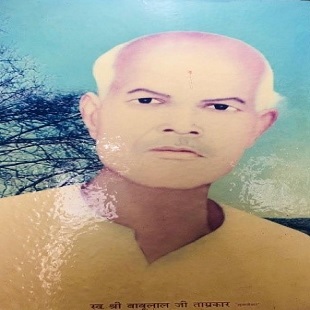 Babulal, renowned as Babulal Bookseller was born on 13 January 1901 in Damoh to Ghanshyam Tamrakar, a humble businessman. Although he completed his education up to middle school, Babulal chose to leave school. Setting up his shop in the bustling Ghantaghar market of Damoh city, Babulal specialized in selling textbooks, religious texts, and stationery.
Babulal, renowned as Babulal Bookseller was born on 13 January 1901 in Damoh to Ghanshyam Tamrakar, a humble businessman. Although he completed his education up to middle school, Babulal chose to leave school. Setting up his shop in the bustling Ghantaghar market of Damoh city, Babulal specialized in selling textbooks, religious texts, and stationery.
Behind Babullal’s bookselling business, he had a clandestine operation. He covertly distributed revolutionary literature to the youth, carefully evading the watchful eyes of the government. He ardently believed in revolutionary ideology, actively participating in the freedom struggle since his days as a student. During the Salt Satyagraha in 1930, Babulal’s involvement led to his arrest. He endured a six-month imprisonment in both Damoh and Sagar jails. On 2 December 1933, Mahatma Gandhi visited Damoh, and Babulal joined other freedom fighters in warmly welcoming him.
Babulal's commitment to the cause led him to further activism. In 1941, he participated in the Jungle Satyagraha, resulting in another three-month jail term. Even after his release, the British government kept a watchful eye on him until 1945.
Following India's independence, Babulal engaged in various social reform initiatives. In recognition of his contributions, the Government of India honoured him with a copper plate in 1972.
Babulal passed away on 6 March 1975.
Gyanchandra Srivastava
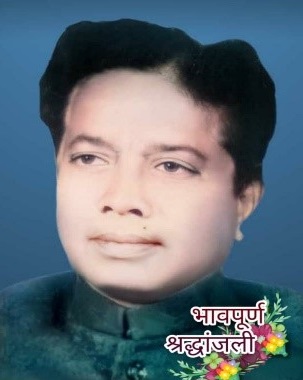 Gyanchandra Srivastava was born on 21st July 1926, the son of the patriotic Devkinandan Srivastava. In 1942, the fervour of the freedom movement engulfed Damoh, much like the rest of the country. Gyanchandra, then a 10th-grade student, became an active participant in the Quit India Movement, devising a plan that troubled the British government.
Gyanchandra Srivastava was born on 21st July 1926, the son of the patriotic Devkinandan Srivastava. In 1942, the fervour of the freedom movement engulfed Damoh, much like the rest of the country. Gyanchandra, then a 10th-grade student, became an active participant in the Quit India Movement, devising a plan that troubled the British government.
Together with his friends Ramnarayan Mishra and Mahadev Prasad Gupta, Gyanchandra orchestrated a bombing at the government school. The headmaster of the school, Ambika Prasad Srivastava, who happened to be Gyanchandra's uncle, testified in court, implicating Gyanchandra as the main culprit in the bombing case in 1942. As a result, he was sentenced to death and sent to Nagpur Jail alongside his companions. However, due to his age, which was less than 18 years, his death sentence was commuted. Upon completing his jail sentence, Gyanchandra aspired to continue his studies in Damoh, but the school administration denied him admission. Consequently, he passed his matriculation from Motilal Nehru School in Sagar. To pursue higher education, he ventured to Kanpur, as Damoh lacked institutions for advanced learning at that time.
Gyanchandra was awarded a Tamra Patra by the Mahakoshal Regional Congress Committee in 1947 for his contribution to the freedom struggle.
In a collective effort, Gyanchandra and other social workers formed the Education Promotion Committee, which aimed to establish a college and introduce higher education in Damoh. In the academic year 1950-51, Gyanchandra Srivastava assumed the role of the first principal of the inaugural college in Damoh, thus imbuing his name with purpose and igniting the flame of knowledge in the region.
On March 13, 1990, Gyanchandra Srivastava passed away, leaving behind a lasting legacy.
Puran Chand Jain
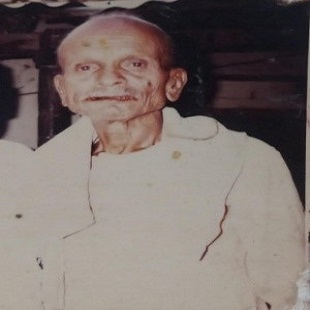 Puran Chand Jain was born on January 16, 1916, in Naindhara village of Banda tehsil in Sagar district. Sadly, when he was just seven years old, his father Hazarilal passed away. Puran Chand Jain's brother-in-law then took him to Ganeshganj Shahpur, near Damoh. Subsequently, he received his education at the Badnagar Orphan Ashram, continuing until the completion of his studies after the 4th grade.
Puran Chand Jain was born on January 16, 1916, in Naindhara village of Banda tehsil in Sagar district. Sadly, when he was just seven years old, his father Hazarilal passed away. Puran Chand Jain's brother-in-law then took him to Ganeshganj Shahpur, near Damoh. Subsequently, he received his education at the Badnagar Orphan Ashram, continuing until the completion of his studies after the 4th grade.
On October 29, 1933, Mahatma Gandhi visited Damoh to inaugurate the Harijan Temple.After this, Puran Chand started actively working against British rule. In 1939, he participated in Subhas Chandra Bose's "Tripuri Convention" held at Tilwara Ghat in Jabalpur. Embracing the spirit of the "Do or Die" movement, on September 4, 1942, Puran Chand and his four companions were arrested by the city council for hoisting a flag. The British authorities attempted to remove the flag, but he defiantly hoisted it again. As a consequence, he and his companions were apprehended and sent to Sagar Jail. He was sentenced to seven months and fourteen days of imprisonment. He was eventually released from jail on April 17, 1943.
After India gained independence, Puran Chand Jain's remarkable contributions were recognized and honoured. In 1947, he received a prestigious copper plate in recognition of his services from the Mahakoshal Regional Congress Committee. Furthermore, in 1972, the Central Government bestowed upon him another significant accolade for his outstanding dedication and efforts by awarding a copper plate.
Puran Chand Jain passed away on September 21, 2011 in Damoh district.
Harditta Singh
Harditta Singh, also known as Khail Singh was born on 23 August 1923, in the village of Sedda in the Gujarat district, East Punjab, which is now a part of Pakistan. Filled with a deep sense of patriotism and love for his country, Harditta Singh was deeply moved by the atrocities committed by the British and was determined to uproot their presence from India. With this fervor, he actively participated in the Quit India Movement initiated by Mahatma Gandhi against British rule in India.
On 10 April 1942, Harditta Singh was sentenced to three months in jail for his involvement in the freedom struggle. During his time in Gaya jail, he endured various forms of torture. However, upon his release, he did not remain silent and continued his struggle. As an act of protest, he planted a bomb on a railway line. Subsequently, he was found guilty in court and sentenced to one year and three months of rigorous imprisonment in Gujranwala Jail.
Even after India achieved independence on 15 August 1947, the country was marred by the tragedy of partition. Harditta Singh, too, suffered from this division and became a refugee, leaving Pakistan behind. He eventually settled in the Kalahandi district of Odisha before finally relocating to Damoh in 1953. Despite the hardships he faced, he remained active in politics and steadfastly rejected the government's proposal of a pension for freedom fighters. Harditta Singh passed away on 24 September 1987.
Raja Mardan Singh
The year 1857 marked a significant turning point in India's struggle for freedom. The news of the revolution that ignited in Meerut spread like wildfire in Kanpur, Delhi, and other regions of North India, including Jhansi. The rebellion in Jhansi began when two British houses were set ablaze. The leaders, who commanded the area, swiftly mobilized their troops to suppress the uprising. However, an ally of the Rani of Jhansi, the courageous warrior King Mardan Singh of Bhanpur, learned of the situation and took action.
Upon receiving the news, Mardan Singh gathered a large army force in Lalitpur and seized control of the railway station. He captured the British officers stationed there and escorted them to Chanderi. On June 16, he declared the state independent. In response, an army was dispatched from Sagar under the leadership of Major Roshan. Unfortunately, their progress was halted at Malthon Sagar due to the blockade set up by the Bundela revolutionaries. Raja Mardan Singh had already been captured in the Narhat Valley.
The soldiers under the command of Area Commander Major Gosan displayed remarkable coordination. They openly rebelled, surrounding Gosan and demanding the immediate release of the prisoners. Forced to comply, Major Gosan released the prisoners and retreated to Sagar. The rebel soldiers sought refuge with Raja Mardan Singh, who had agreed to shelter them on the condition that they bring weapons and work for a monthly salary of ₹12. This arrangement was intended to bolster his military strength.
Meanwhile, Raja Mardan Singh’s supporter Saroj's forces grew angry and advanced towards the valley. However, Raja Mardan Singh had already taken control of the valley. He then proceeded with his army to Madanpur, where he encountered Raja Shahgarh's forces. In the ensuing battle, Sir Hoon Rose's army defeated Raja Shahgarh's forces in Madanpur. He continued to fight against the British in the valley, but the British managed to capture Chanderi, Banpur, and Lalitpur. The museum and library were set ablaze, while the soldiers were hanged. On 10 March 1858, Banpur fell under British control.
The British government offered a reward of ₹8,000/- for the capture of Raja Mardan Singh, dead or alive. After the end of the 1857 revolution, this patriotic leader was apprehended and prohibited from returning to Bundelkhand. He was imprisoned in Lahore Jail on 28 September 1858, and later transferred to Mathura Vrindavan, where he passed away on 22 July 1879. Raja Mardan Singh of Bhanpur's unwavering dedication and bravery in the service of the motherland are unparalleled. This nation will forever remain indebted to such a courageous warrior.
Kaluram Swarnakar
Kaluram Swarnakar was born in 1925 in the Futera ward of Damoh, into a merchant family involved in bullion business. Despite his father, Dev Shankar Swarnakar, wanting him to join the family business, Kaluram Swarnakar had different aspirations. He was deeply influenced by the ideology of Shaheed-e-Azam Bhagat Singh and started a group with his young companions to engage in patriotic activities. Alongside studying Bhagat Singh's literature, he was also inspired by the non-violent methods of Pujya Bapu (Mahatma Gandhi) and the idea of liberating the country through Satyagraha.
He began his movement against British rule, traveling to various places. Initially, his family members tried to persuade him to give up, but his patriotic fervor was unyielding. As he rebelled against the British, the police exerted pressure on him, leading him to go underground with some of his comrades in 1940. Unfortunately, due to an informant's tip, he was eventually captured and imprisoned in Damoh District Jail.
Actively participating in the Quit India Movement of 1942 and advocating for the boycott of foreign goods, he was imprisoned and warned against engaging in anti-government activities upon release. However, Kaluram Swarnakar's patriotic spirit prevailed, and he continued his involvement in such activities.
Even after India gained independence, he remained dedicated to public service through active participation in politics. He served as a councillor in his locality, consistently applying Gandhian principles to benefit the general public. He worked towards providing basic amenities like water and sewerage to a backward and neglected area. Kaluram Swarnakar's name holds a special place in the memories of people, being mentioned with reverence as the 68th individual in the Damoh Gazetteer. Such freedom fighters, deeply connected to the land, who not only contributed to the struggle for independence but also served the common people, will forever be remembered.
Sher Khan
"Don't consider poverty as my weakness, the spirit of patriotism is still in my veins." These lines characterize the life of freedom fighter Sher Khan. Sher Khan was born in 1917 in the family of Fateh Khan in the village Bhiloni Khamaria of Hata tehsil of Damoh district. Due to the non-availability of school in his village, he studied till class 4th in the government primary school of the nearby village of Doli Khamkheda. He got married to Lalita Bai.
Feudalism prevailed in the village. His family got trapped in the clutches of Samant Shahi in such a way that he and his whole family came to live in Damoh after getting upset. After coming here initially, he started working as a laborer to feed his family. The spark of protest against injustice and atrocities was hidden in his heart. After some time, he started working as a coach driver for Singhai ji. Where he started meeting the revolutionaries Raghuvar Prasad Modi, Premchand Jain and Dwarka Prasad Srivastava of Damoh city. The company and thoughts of these people turned the spark hidden in his heart into the fire of rebellion and Sher Khan also jumped into the freedom struggle. He took part in the Quit India movement. He was beaten with a stick and got imprisoned for 7 months for the crime of uprooting the railway line in 1942.
The government of India conferred on him a tamra patra in 1972 while commemorating 25 years of Indian Independence.
Sher Khan died on 15 November 1983.
Thakur Kishore Singh
The mutiny of 1857, which originated in Meerut's Barrackpore cantonment, gradually spread throughout the country, and Bundelkhand in Madhya Pradesh was no exception to this revolt. Thakur Kishore Singh was born into a prestigious family belonging to the Mahdele sect of society. The attack of Mangal Pandey's bullet in 1857 sparked anti-British sentiments across the nation. The rebellion had spread significantly in Jhansi, Damoh, Narsinghpur, Jabalpur, and other surrounding areas of Bundelkhand.
In Damoh, Thakur Kishore Singh and his companions led the freedom struggle in 1857. Despite having limited resources, Thakur Kishore Singh, with the help of Balakot's Rao Saheb Swaroop Singh, Sone Singh, Man Singh, and other revolutionaries, showed indomitable bravery and courage by giving an open challenge to the British. On July 2, 1857, the Deputy Commissioner of Damoh ordered to keep one and a half lakh rupees of the treasury in the jail fort, and on July 4, a group of rebels led by Thakur Kishore Singh went to the jail fort and demanded the money.
Subedar Major and Havaldar Ranjit Singh refused to give the money, which resulted in a skirmish between the two sides. Despite being a part of the army, Kishore Singh fought there. Kishore Singh then left for the countryside, and Raja Bakhat Wali of Shahgarh and Raja Mardan Singh of Manpur sent military aid to the revolutionaries of Damoh. Under the leadership of Thakur Kishore Singh, the farmers around Damoh, many talukdars, and small landlords supported the revolutionaries.
In the rural areas, Thakur Kishore Singh and Raosaheb Swaroop Singh, along with their associates attacked Damoh on July 10. They captured the police station and destroyed the records of the tehsil and munsif offices. Captain Pinky arrived from Sagar with two battalions and two guns of the 31st Infantry to fight against Thakur Kishore Singh and his soldiers. The 42nd Infantry was sent to fight against them at Hindoria, 12 miles from Damoh.
By then, Thakur Kishore Singh, along with his 4000 soldiers and Raja Shahgarh's troops, had captured several nearby villages and the Kumhari police station, which was a significant police station at that time. They held their ground for about six months. There were skirmishes between the farmers and the British forces, but the British retreated after losing. Captain Pinky offered a reward of Rs. 1000/- for catching Thakur Kishore Singh, alive or dead. The British also announced a reward for catching Rao Saheb Swaroop Singh, Sone Singh, and Mansingh of Balakot due to their revolutionary activities. Under the leadership of these revolutionaries, the fire of rebellion spread throughout the district, and all the police stations were abandoned. Only two urban headquarters of the British, Sagar and Damoh, were left.
Narayan Prasad Tiwari
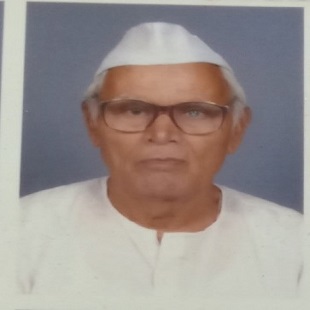 Narayan Prasad Tiwari, a courageous freedom fighter hailing from the small village of Patharia in Damoh district, made significant contributions to the freedom movement in Damoh. Born on 28 October 1925 in the household of Nathuram Tiwari, young Narayan Prasad Tiwari witnessed the plight of his country under British rule and was deeply moved by the call for freedom. Inspired by Mahatma Gandhi's Quit India movement in 1942, he gathered a group of like-minded youth in Patharia who shared their unwavering spirit of patriotism. Determined to bring about change and rid India of British rule, they embarked on a revolutionary journey against the oppressive regime.
Narayan Prasad Tiwari, a courageous freedom fighter hailing from the small village of Patharia in Damoh district, made significant contributions to the freedom movement in Damoh. Born on 28 October 1925 in the household of Nathuram Tiwari, young Narayan Prasad Tiwari witnessed the plight of his country under British rule and was deeply moved by the call for freedom. Inspired by Mahatma Gandhi's Quit India movement in 1942, he gathered a group of like-minded youth in Patharia who shared their unwavering spirit of patriotism. Determined to bring about change and rid India of British rule, they embarked on a revolutionary journey against the oppressive regime.
On that fateful day, 9 August 1942, when Mahatma Gandhi called for the Quit India Movement, 15-year-old Narayan Prasad Tiwari, fuelled by his passion for the motherland, orchestrated a powerful demonstration against the British at Jhanda Chowk in Patharia. He symbolically prepared a hanging noose and gallantly placed it around his neck, firmly stating that either the British must leave India or he would sacrifice his life. The audacity of his act sent shockwaves through the British authorities, who swiftly intervened and apprehended Narayan Prasad Tiwari.
He was a young man of innate instinct, brimming with patriotism and a deep love for his motherland. Despite receiving only primary education in the humble village of Patharia, he possessed an unwavering resolve to inspire the youth toward patriotism. He actively participated in Mahatma Gandhi's Quit India movement and the boycott of foreign goods, both pivotal campaigns in the fight for independence. However, his patriotism burned brightly, refusing to be extinguished. His relentless dedication to the cause drew the attention of the British authorities, who repeatedly tried to dissuade him from his patriotic activities. Undeterred, he continued his fight against the British under the able guidance of Patharia's admired freedom fighters, including Chintaman Tiwari, Babulal, and Babulal Jain.
The British, alarmed by his persistent activism, arrested Narayan Prasad Tiwari once again, this time incarcerating him in Jabalpur Jail. There, he endured nine months of rigorous imprisonment, yet his spirit remained unbroken. Even behind bars, he fearlessly raised slogans of "Vande Mataram," "Bharat Mata ki Jai," and "Mahatma Gandhi ki Jai", serving as an unwavering symbol of resistance against the oppressors.
Upon his release from Jabalpur Jail, he resumed his mission of awakening and mobilizing the youth of the nation. His unwavering commitment to the cause of independence was evident as he fearlessly confronted the challenges that lay ahead. He was even subjected to a three-month punishment of eating his meals within the confines of a six-foot-long and six-foot-wide room, emphasizing the relentless pursuit of his goals despite immense personal sacrifice.
Premchand Kapadia
Premchand Kapadia was born in February 1923 at his ancestral residence, known as Phoolchand Jain Kapadia's house. His family was renowned in the cloth business, hence the name Kapadia. Their ancestral home was situated near the present-day Purana Thana police station. During his childhood, he witnessed the oppressive policies of the British Inspector and the revolutionary war, which deeply impacted his life.
Inspired by the freedom fighters, he actively raised his voice against the British Government's oppressive policies. He actively participated alongside freedom fighter Raghuvar Prasad Modi in various movements and activities against the British government. In 1939, he underwent a 21-day training as a volunteer in Tripuri Congress, where he had the opportunity to meet Netaji Subhas Chandra Bose.
Kapadia was greatly influenced by Bose's thoughts, which further fuelled his activism for freedom. On 8 August 1942, he went to Bombay to join the Quit India Movement, drawing inspiration from the protests and activities advocating for independence. Carrying important information and materials, he travelled to Jabalpur via the Itarsi route, where he discreetly hid the rest of the material at his in-law's house in Bada Fuhara, Jabalpur, while he himself was arrested and sent to Jabalpur jail.
He was released from jail on 15 February 1943, and actively engaged in military training while being associated with the Azad Hind Army. He organized the movement by forming a peace army. On 25 March 2006, he passed away at his residence, Hawk Ganj Baranda, near Gandhi Chowk, where he had conducted continuous activities during the freedom movement.
Ram Manohar Lal Srivastava
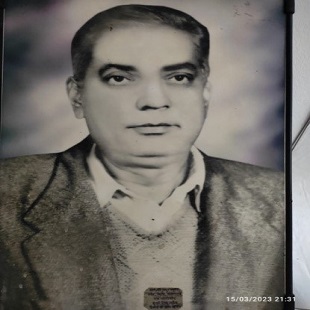 Ram Manohar Lal Srivastava, born in 1918 in the Futera locality of Damoh, Madhya Pradesh, was a renowned freedom fighter and a key figure in the revolution and freedom struggle of 1857. His father, Thakur Prasad Srivastava, was a patriotic individual who adhered to Gandhian principles. Ram Manohar Lal Srivastava received education up to matriculation and emerged as the favourite child of his father.
Ram Manohar Lal Srivastava, born in 1918 in the Futera locality of Damoh, Madhya Pradesh, was a renowned freedom fighter and a key figure in the revolution and freedom struggle of 1857. His father, Thakur Prasad Srivastava, was a patriotic individual who adhered to Gandhian principles. Ram Manohar Lal Srivastava received education up to matriculation and emerged as the favourite child of his father.
In 1942, when the Quit India movement gained momentum following Mahatma Gandhi's call for independence, he inspired by the spirit of liberation, joined the freedom movement. He actively participated in the non-cooperation movement in Damoh. Along with numerous other revolutionaries and freedom fighters, such as Prabhu Narayan Tandon, Mahadev Prasad Gupta, Gaya Prasad Pyasi, and Raghuvar Prasad Modi, he gathered at Damoh's Gandhi Chowk to strategize and plan for the country's liberation.
Driven by his admiration for Gandhi and his ideologies, he wholeheartedly embraced the boycott of foreign goods, disregarding government warnings against boycotting the foreign clothes. His deep reverence for Gandhiji made him resonate only with the tricolour flag but also the chant of "Vande Mataram." Consequently, he was arrested and sentenced to six months of imprisonment in Damoh Jail. Even while being incarcerated, he continued to sing patriotic songs like Vande Mataram and shared stories of Mahatma Gandhi. His unwavering commitment to the cause of independence earned him a prominent place in the Damoh Gazette of that year, where his name is recorded as number 58.
Prabhu Narayan Tandon
Prabhu Narayan Tandon was born on 10 December 1922, in the present district Damoh of Madhya Pradesh, to a wealthy merchant family. During the era of Mahatma Gandhi, the freedom fighters in this small district were passionate about attaining independence from the British rule.
Prabhu Narayan along with other freedom fighters, organized "Prabhat Pheri" against British Raj. This earned him popularity among the masses, who lovingly called him "Babba," a synonym for "bapu" in the Bundelkhand dialect.
His passion for serving his motherland and its people led him to become a dedicated freedom fighter as he grew older. In 1941, when Babba was a 9th-grade student in a government school, he hoisted the Indian flag on the school's terrace during a nationwide "Jhanda Satyagraha." When English officials attempted to remove the flag, he led a group of student Satyagrahis and resisted the removal. This act led to his arrest for two days but was later released with a stern warning.
The Quit India Movement call by Mahatma Gandhi on 9 August 1942, became a stepping stone for Babba and his supporters. When freedom fighters from district Damoh and its surrounding regions were arrested and imprisoned in Nagpur Central Jail, it was Babba and other student activists who played a decisive role in keeping the movement alive in the district.
In September 1942, a blast took place in the chemistry lab of the government High School during an attempt to design an explosive bomb. Babba and other students were arrested under charges of making explosive bombs. His arrest did not deter his courage, and he continued to keep the movement alive in Sagar jail. Constantly raising the slogan "British Go Back" during officials' visits led to his segregation from other inmates, and he was transferred to Nagpur Central Jail. After nine months of strict confinement, he was released.
In 1944, following widespread arrests by police officials after a bomb blast near Bandakpur station, Babba went undercover and sought refuge with his student friend in Kanpur, Uttar Pradesh. After India gained independence in 1947, Babba's passion for serving the people and improving their lives led him into politics.
Babba remained committed to the principles of Mahatma Gandhi, making "khadi" an essential aspect of his life. He initiated a revolution against untouchability and worked for the upliftment of scheduled classes. He also served as the president of the "All India Potters & Vendors Association" and fought for the rights of coolies and poor labourers.
In February 1990, while campaigning for elections, Babba suffered a massive heart failure and passed away.
Shivprasad Singhai
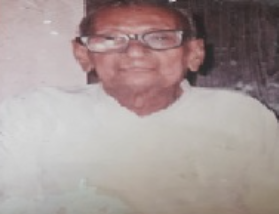 The Singhai family's residence in Haak Ganj Baranda, Damoh, is renowned for its contribution to the freedom movement. The family's passion for freedom has earned them a prominent place in the national movement. Gokulchand Singhai, a lawyer, along with Gulabchand, Shivprasad, and Ratanchand have all been to jail for their involvement in the movement. Shivprasad, the son of Singh Gulabchand, was born on 29 May 1921. He was attending secondary school when Mahatma Gandhi visited Damoh. As a student, Shiv Prasad missed a day of school to hear Gandhiji's speech. However, when he returned to school the next day, the headmaster beat him with a stick and expelled him for missing school. Consequently, he dropped out of school and never returned, thus ending his education.
The Singhai family's residence in Haak Ganj Baranda, Damoh, is renowned for its contribution to the freedom movement. The family's passion for freedom has earned them a prominent place in the national movement. Gokulchand Singhai, a lawyer, along with Gulabchand, Shivprasad, and Ratanchand have all been to jail for their involvement in the movement. Shivprasad, the son of Singh Gulabchand, was born on 29 May 1921. He was attending secondary school when Mahatma Gandhi visited Damoh. As a student, Shiv Prasad missed a day of school to hear Gandhiji's speech. However, when he returned to school the next day, the headmaster beat him with a stick and expelled him for missing school. Consequently, he dropped out of school and never returned, thus ending his education.
Shivprasad joined the Vanar Sena during the Salt Satyagraha and also served as a secretary in the Congress office. When his younger brother, Ratanchand Singhai, was caught in 1942, he went into hiding. When the police searched his home and failed to find him, they took away his father, Singh Gulabchand ji. Shivprasad was eventually caught on 1 October 1942 and sentenced to five months and five days in Sagar jail. However, he was released on 16 March 1943 after completing his sentence. He made invaluable contributions to the freedom struggle and fulfilled all his responsibilities before passing away on 11 January 1999 at his ancestral home.
Source :
- Hariom Khare, Contributor for CCRT
- Premlata Neelam, Contributor for CCRT
- Rajeev Ayachi, Contributor for CCRT
- Rajeev Krishna Birthray, Contributor for CCRT
- Narendra Dubey, Contributor for CCRT
- Azadi Ka Amrit Mahotsav
Last Modified : 9/4/2023
This topic provides information about People and P...
Provides information related to People and Person...
Provides information related to People and Persona...
This topic provides information about People and P...
